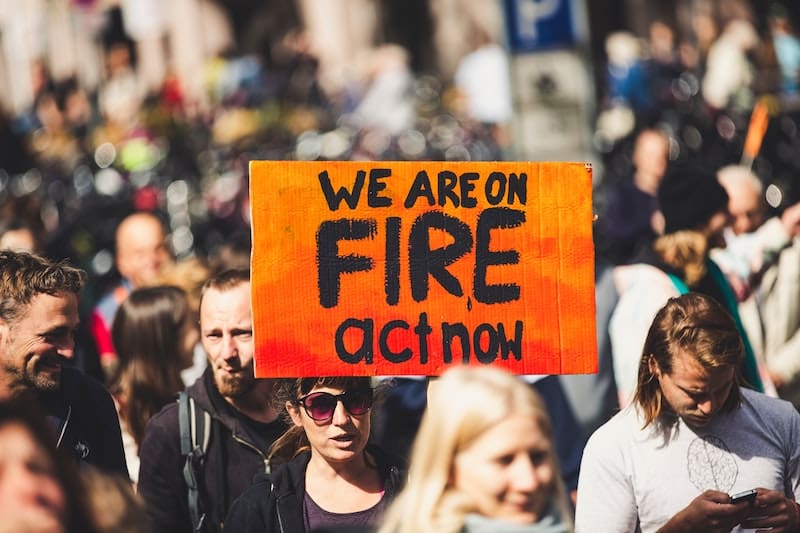What a strange year 2020 has been. We entered it under a fog of smoke with parts of the country barely able to breathe, and growing community anger as fires burned. The links were being made stronger than ever, the fires were due to climate change – surely there would finally be decisive action taken, surely there was no choice but to do something about it. And then Covid hit – slowly creeping up and then snowballing – and the way we live our lives changed, cities went into lock down, many businesses and schools closed, so many people lost their jobs and others worked from home. We radically shifted the way we go about our lives in the span of weeks.
The pandemic threw existing inequalities and dysfunctional systems into sharp relief. Suddenly the role of government seemed much more relevant to people’s everyday lives. The recurring theme of discussions was people’s health, people losing their jobs and the state of the economy. The 24-hour news cycle of logging the increasing cases made one thing very clear: the community expected the government to act in a way that protected lives. Even while the pandemic continues to rage across the globe, making it clear that there is a long way to go until we can return to what was considered normal, the conversation is turning to what life looks like in a post-covid world. For many people normal was not good – can’t we make it better?
In many ways the pandemic has made our worlds smaller. Some of us are locked down to our houses, state borders are closed, gap years a thing of the past, zipping around the country or globe to visit friends and family no longer easily possible. There are many things that I think all of us are looking forward to at this end of this pandemic. But is it clear that there are many things that need to change. We can not squander this unique opportunity to make our new normal better. Government cannot return to its tired old ways. A gas-led recovery, for crying out loud. Jobs for the blokes when women and young people have been the most affected, reducing income support while providing tax cuts – the list goes on and on.
One of the important lessons we must learn from Covid-19 is that it is essential that government plays an important role in building community. We need government that shows leadership during times of crisis, that prioritises investing in everyone, and understands the economy is meant to serve the people.
What would an economy that serves people and communities look like? An economy that served people and community would mean no-one was left in poverty. That everyone could access affordable and safe housing. That First Nations peoples would be more likely to end up with a higher education than incarcerated, that older Australians were provided with the appropriate level of care when they need it. It would mean urgent action to address climate change.
For so long the prevailing wisdom has been slow incremental changes is how problems need to be tackled, that benefits would trickle down – so for those of us who have been calling for action to increase income support payments the initial government response to the pandemic was heartening. The government made large scale changes, quickly and responsively in many areas to the unfolding crisis, and it did it in response to expectations and pressure from the community. People expected that they would be protected, expected that when they found themselves out of work they would not fall into poverty, and that people would be put before profit and the economy.
The temporary changes made to the social security system by the government were an admission that the system forced people into poverty, was unresponsive, difficult to access, and punitive. Once there was the political will, many changes were made that greatly improved the system. Increased staffing, the removal of punitive approaches like mutual obligations, easier access, reduced means testing – people were treated humanely. But these measures were temporary, and they shouldn’t be.
The pandemic has exposed the ugly realities that many Australians have been living with, but it has also shown us that government can still be relevant, that they can make bold policy decisions. Now is the time for bold decision making. Government can choose right now to address climate change, invest in green manufacturing and renewable energy, in environmental repair and protection, in the care economy, and to keep people out of poverty. They can choose to put in place a guaranteed adequate income and a jobs guarantee. They can choose to finally address our unfinished business and admit this land was stolen and negotiate a treaty/treaties with our First Nations peoples.
Even if a vaccine is found in the near future, even if life returns to as it was before long, the threat of uncertainty that the climate crisis brings is growing. It may look like long summers of bushfires, it may be stronger hurricanes and cyclones, or large-scale flooding, extended droughts, rising sea levels. These compounding emergencies bring mass displacement and struggles over resources. However it plays out, it is clear that uncertainty is in our future in order to thrive we need to have robust, responsive systems that have people’s wellbeing at their core. Our economy and our government should serve people and community.
We need action. Bold, transformative action only takes place when it is demanded by the community. If we want a post-Covid future that will be able to handle the challenges ahead, it will need our involvement, attention and advocacy.

One thought on “‘Now is the time for bold decision making’: Senator Siewert on the lessons of 2020”